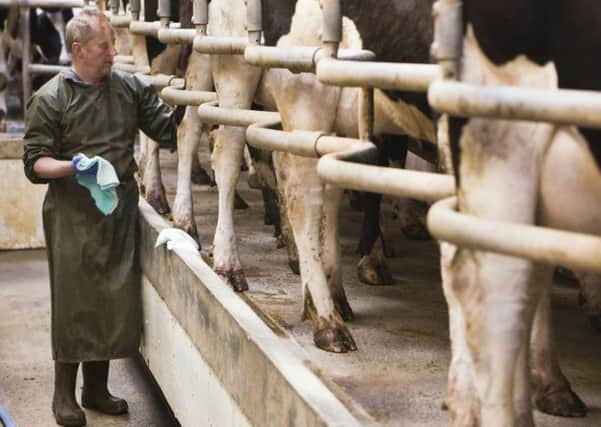Warning that Northern Ireland farm subsidies could halve by 2030


Farmers will have to do more for less funding due to changes envisaged under any scenario short of Remain, a consultant from the Andersons Centre said.
Any kind of exit from the EU will see the UK leave the Common Agricultural Policy (CAP), which has underpinned the sector’s finances for decades.
Advertisement
Hide AdAdvertisement
Hide AdMichael Haverty from Andersons said: “The fear seems to be that, without some commitment, future politicians will raid farm funding for other purposes.
“We don’t believe that funding will disappear completely, but will be at much lower overall levels in a decade.”
He said possibly 50%-60% of present funding in real terms would reach farmers by 2030 if the European system was replaced by a UK one.
Last summer Northern Ireland’s agriculture department consulted on a framework around the CAP.
Advertisement
Hide AdAdvertisement
Hide AdIt is intended to boost competitiveness and ensure the long-term viability and sustainability of agriculture.
Productivity and protecting the environment are priorities.
Mr Haverty said: “Relative to the world market, Northern Ireland produce is relatively expensive.
“Therefore a quality-focused market orientation approach that emphasises and enhances the unique selling points of Northern Ireland produce is crucial.”
A conference supported by the Irish Farmers Journal and the Livestock and Meat Commission on the prospects for Northern Ireland’s agriculture industry was held in Armagh on Thursday.
Advertisement
Hide AdAdvertisement
Hide AdIt also addressed labour requirements. Thousands of workers are needed to pick fruit alone.
A government white paper has suggested five-year permits would be available for higher-skilled workers.
The proposed threshold defining higher income would be £30,000, beyond the level of many migrant workers currently in Northern Ireland.
Mr Haverty said the government’s Migration Advisory Committee appeared to want less cheap labour so productivity would be boosted.
Advertisement
Hide AdAdvertisement
Hide AdHe added: “It is not clear that the current proposals really understand the situation in the agrifood sector.”
Statistics showed the employment of indigenous labour has been relatively static.
Mr Haverty said: “This suggests that immigrants have not ‘taken locals’ jobs’. Instead a ready supply of good quality and cheap labour has allowed the sector to grow.
“That may have actually supported higher-paid domestic jobs in the sector.”
Advertisement
Hide AdAdvertisement
Hide AdMr Haverty said that without a deal there would be a degree of “chaos”.
“Profitability is likely to be down as the costs involved with any trade, imports or exports, are a deadweight loss to the farming sector.”